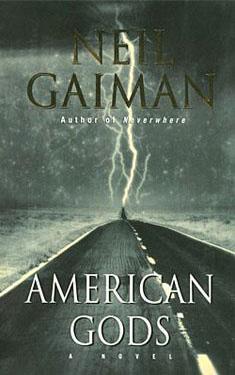Neil Gaiman
Completed 1/5/2015, Reviewed 1/11/2015
5 stars
The more SF I read, the more likely I am to reread a
book. “American Gods” was an easy
candidate for several reasons. One, I needed
to complete my reviews of Hugo winners, and I read it before I was writing
reviews. Two, it took me too long to read it the first
time and I got lost in it a couple of time.
Since my first read of it around 2005, my reading commitment, and
therefore my comprehension, has gotten a lot better. Three, having had a lot more exposure to
non-Greek and Roman mythology through my fantasy readings and personal
experiences, I’ve found myself more intrigued by the premise of the book: a war between the ancient gods and the gods
of modern technology and society.
It’s tough to pin down a favorite part of the book. It’s simply masterful in every way. Shadow, the
main character, is easy to
identify with. Down on his luck, barely
hanging on to sanity, he’s just coasting along, doing what he needs to do to
survive. That happens to be being an
assistant to a Norse god, who he seems much more like a mob boss than a deity. Shadow is constantly put into precarious
situations, but has a dark guardian angel in the animated corpse of his
deceased wife. She’s sort of an
anti-deus ex machina device. If you’re
going to have a deus ex machina, this is the way to do it.
He travels the Midwest meeting other gods, all of whom are
old and barely making it in the modern world themselves. As Oden’s sidekick, his mission is to help
convince these others to join Oden in a battle for their survival. And of course, there’s the modern gods, like
TV, trains, and cars, who are bent on getting Shadow to side with them. In a particularly fun scene, as he begins
nodding off in a hotel room with the TV on, Lucy Ricardo, not Lucille Ball,
engages him in a conversation in the middle of an episode of “I Love Lucy” and
attempts to seduce him.
Throughout the story, we get snippets of how some of the
ancient gods came to the New World, as it was settled by the Old World, often
supplanting the gods of the earlier inhabitants. Shadow’s meetings and these interludes help
create a very believable world of the odd and supernatural, reminiscent of the
feel of some of Clive Barker’s disturbing settings, though less horrifying. And through all this, there’s even a mystery
of the disappearance of young girl from a sleepy Midwest town, which at first
seems extraneous, but turns comes full circle at the end of the book.
As complex as the plot is, it never feels complicated.
Gaiman is an amazing writer and storyteller.
He writes prose that doesn’t seem like prose. It’s literary without being stuffy. The plot and the action move the story like a
suspenseful pop novel, but the prose creates a mood and effect that leaves the
reader stunned and breathless.
It’s difficult to write more details about “American Gods”
that doesn’t reveal the climactic denouement and the shocking twist. Even having read it once before, I was
surprised at how effective it was on my second read. While I didn’t have some life changing emotional
response to this book, I found it truly wondrous. When I finished it, I understood why so many
people have read this book over and over, because I wanted to immediately reread
it again. “American Gods” is simply magical. Little wonder that it was nominated for and won so many awards. Five out of five stars.

It is a fantastic book. I could live without some of the more explicit things in the story that, to me, simply seem to be there for shock value. At the time Gaiman had not written much besides more tame (but wonderful) fantasy and this felt like his attempt to write an "adult" book, much like his more "adult" content Sandman stories, and so some of the boundary pushing seemed a bit much to me.
ReplyDeleteHowever, it really is great. Shadow is such an interesting character to follow.
If you have not read the novella, Monarch of the Glen, which is in the Fragile Things collection, now is the time. It is a Shadow story that takes place 6 months after the events in American Gods, and it is very good.
I actually found the adult content less disturbing than the polyamory and free sex infatuations of some of the authors of the golden age, like Heinlein. I'll definitely have to see about Monarch before I get too far away from A.G.
DeleteThere is a violence that Gaiman often infuses his sexual content with that disturbs me. Happens in some of his short stories too. I'm a BIG fan of his work, but have found that there are stories that I've read once, found little to no value in, and would never read again. They simply felt like exercises to write shocking fiction to prove that he doesn't just write for kids. Now I know that isn't the real reason he has done so, or I assume not anyway, but I find such little value in that that I see no other valid reason for it to exist.
ReplyDelete